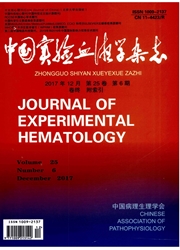

 中文摘要:
中文摘要:
目的:应用人红白血病TF-1细胞系模型,研究SPK信号通路在细胞增殖和糖代谢中的作用。方法:应用慢病毒介导的shRNA干涉策略,干涉TF-1细胞中SPK的表达。通过RT-q PCR和蛋白印迹技术检测SPK在TF-1细胞中干涉效率。应用CCK-8测定细胞增殖活力,通过流式细胞仪检测Annexin V染色确定细胞凋亡情况。结果:低氧能够诱导TF-1细胞中HIF-1α、HIF-2α和SPK的上调,证明SPK是低氧诱导表达的重要分子。SPK-shRNA转染能够明显抑制TF-1细胞的增殖并且诱导TF-1细胞的凋亡。SPK敲减明显减低细胞葡萄糖的利用和消耗。结论:SPK是参与调节低氧诱导细胞增殖和葡萄糖代谢的关键信号分子,在低氧诱导细胞反应中发挥重要作用。
 英文摘要:
英文摘要:
Objective: To clarify the roles of SPK pathway in the regulation of proliferation,survival and glucose consume of human erythroleukemia TF-1 cells. Methods: The interfering in SPK expression of TF-1 cells was performed using leutivirus vector-mediated shRNA,the interference efficacy of SPK in TF-1 cells was detected by RT-qPCR and Western blot,the viability of TF-1 cell proliferation was detected by using CCK-8 method,the apoptosis of TF-1 cells was determined by flow cytmetry with Annexin V staining. Results: Hypoxia up-regulated the expression of HIF-1α,HIF-2α,and SPK in TF-1 cells. SPK treatment resulted in reduced proliferation and induced apoptosis in TF-1 cells.Furthermore,knockdown of the SPK significantly reduced utilization and consumption of glucose. Conclusion: The SPK is key signalling molecule involved in regulation of hypoxia-induced proliferation and glucose metabolism in TF-1 cells,and plays an important rote in proliferation and energy metabolism of leukemia cells.
 同期刊论文项目
同期刊论文项目
 同项目期刊论文
同项目期刊论文
 期刊信息
期刊信息
